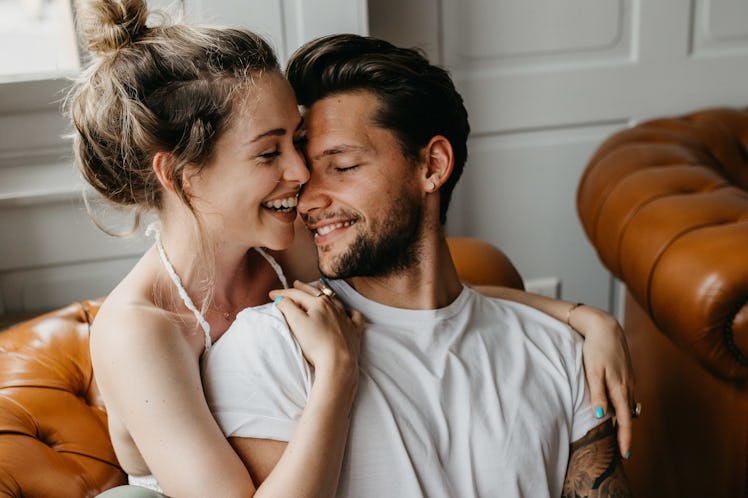
Here's What Experts Have To Say About Coronavirus & Kissing
A quick peck on the lips with your partner can feel like the most natural thing in the world. A steamy makeout sesh with a friend with benefits or an after-date kiss with your latest Tinder match might seem equally harmless and easy. But while the coronavirus continues to spread around the world, you might want to consider steering clear of contact and exercising extreme caution. Kissing can transmit coronavirus, and ultimately, it’s better to be safe than sorry.
COVID-19, a respiratory disease caused by a novel coronavirus, has been detected in countries all over the world, including the United States. It is primarily spread through human contact through the mucus membranes in the face (the mouth, eyes, and nose), so touching anything that’s been in contact with an infected person’s respiratory droplets and then touching your face, for example, can expose you to the virus. “Coughing and sneezing can also expel saliva, as well as mucus,” Vincent Racaniello, Ph. D., Higgins professor of microbiology and immunology at Columbia University, tells Elite Daily.
The severity of the pandemic varies by region, with some cities and states reporting more cases than others, but the Centers for Disease Control and Prevention (CDC) recommend avoiding close contact with people who are sick and putting distance between yourself and other people if coronavirus is spreading in your community. All these factors considered, swapping saliva is a no-go if coronavirus is spreading in your community, since you or your potential partner could be an asymptomatic carrier.
“Any type of droplets, whether they be respiratory or saliva, can spread the virus, so kissing is definitely going to be something you want to be very careful about,” Dr. Darshan Shah, founder and medical director of Next Health, previously told Elite Daily. “And definitely when you’re in close quarters with someone, like in a romantic situation, you’re going to be spreading respiratory droplets to each other as well, so you need to be very careful.”
There’s no way to tell if you’ve been exposed to coronavirus right away, because symptoms (fever, cough, shortness of breath), don’t show up right away and transmission depends on what you both have been exposed to. "For the first five to 10 days, people won't exhibit any symptoms at all," says Shah. "So even though someone doesn't have symptoms, it doesn't mean they don't have coronavirus." According to the CDC, coronavirus symptoms might not show up in infected individuals until two to 14 days after exposure, so even if the other person says they feel totally fine, be vigilant and think twice. Shah recommends asking them if they’ve been traveling recently, “especially to one of the affected areas,” or if they’ve been around other people who are showing symptoms. “So, if they have a family member at home that has symptoms, or if they know that they work at a place where someone was diagnosed with coronavirus, those are the types of situations where they really need to be careful about their intimacy.”
“Once infected, there’s little that can be done,” says Racaniello. If you are not yet showing symptoms, Shah recommends trying to boost your immune system with foods like ginger and leafy greens, green tea, and spices like turmeric and oregano. Get seven to eight hours of sleep every night, and try to keep your stress levels down as much as possible. If you can exercise at home for a little bit every day, that’s also a good idea. “That’s really all you can do if you don’t have symptoms,” Shah says. But if a few days have passed since your makeout and you're feeling symptoms, the CDC recommends self-quarantining as much as possible and calling your doctor to figure out next steps.
If you have an exclusive partner who you know hasn’t traveled abroad and hasn’t, to their knowledge, been around any potential contaminated situations or people, Shah says you’re “probably OK to go ahead and kiss each other.” He still recommends adhering to the CDC guidelines making sure you and your partner are both practicing social distancing (the practice of "deliberately increasing the physical space between people to avoid spreading illness," according to Johns Hopkins Medicine) from others for at least 14 days in order to avoid exposing yourselves, and thus, each other if you want to keep kissing regularly.
If you think you’re showing symptoms of coronavirus, which include fever, shortness of breath, and cough, call your doctor before going to get tested. If you’re anxious about the virus’s spread in your community, visit the CDC for up-to-date information and resources, or seek out mental health support. You can find all Elite Daily's coverage of coronavirus here.
Experts:
Vincent Racaniello, Ph. D., Higgins Professor of Microbiology and Immunology at Columbia University
Dr. Darshan Shah, founder and Medical Director of Next Health
This article was originally published on